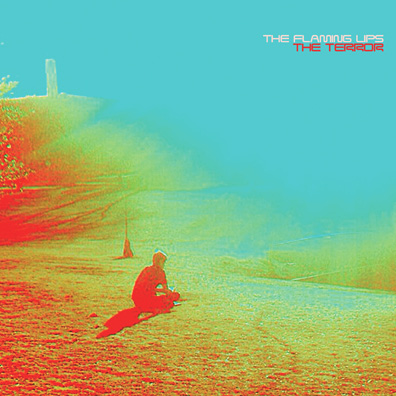
In a way the musical trajectory of The Flaming Lips closely matches that of one of their greatest influences, Pink Floyd. Both bands started out making noisy, druggy psych rock with loads of dark eccentricities. As both bands gained exposure their material became more dense, complex, and concept-oriented. They were crafting symphonies with their rock music rather than just writing songs. Even as both of these bands grew to become household names, their music and experiments just became more complex in the process. There aren't many bands that can gain such substantial notoriety while keeping their ever-expanding artistic vision intact. In Pink Floyd's heyday, they could do whatever they wanted and retain their success, and The Flaming Lips have been in that camp for years.
Ever since The Flaming Lips' 2009 double album Embryonic this band has just been piling on experiment after experiment and basking in their too-big-to-lose status. Among these include releasing at least one song every month in 2011, collaborations with the likes of Lightning Bolt, Neon Indian, Yoko Ono, and Ke$ha (of all people), and a 24-hour song. Yep. But all this seems to have been in place of putting out a new full length album, rather than in preparation of one. We got a fairly cohesive collaborative album on Record Store Day last year, but The Terror is the first proper studio LP we're getting from the Lips since 2009's Embryonic. Before you consider anything else, just bet on this: this band is not done reinventing themselves with every single album.
A press release that frontman Wayne Coyne put out with the album's announcement states the album's concept:
We want, or wanted, to believe that without love we would disappear, that love, somehow, would save us that, yeah, if we have love, give love and know love, we are truly alive and if there is no love, there would be no life. The Terror is, we know now, that even without love, life goes on... we just go on… there is no mercy killing.This feeling is integral to your understanding of The Terror. Vast landscapes of nothingness, loneliness, desolation. The Terror has been called a nightmarish album, but the nightmare here is that you are alone, you are nothing but nothing and the world is full of you.
This album is easily the band's biggest embrace of ambient and drone music, in fact an LP this reminded me of right at the get-go was Tim Hecker's Ravedeath, 1972. The Terror evokes the same kinds of apocalyptic and desolate musical tropes that that LP does so strongly. This album starts off with "Look... the Sun is Rising" which is one of the most fleshed out segments on the album as far as instrumentals. There are live drums, which only appear in a couple other instances, and while many of the electronics and effects on this record mesh together and become an all encompassing atmosphere, there is a singular synth line on this track that is somewhat catchy. That is once you get past how unsettling it can be. Wayne's voice doesn't really shine out on this track though, where it does start making an impression is "Be Free, A Way". Wayne's voice is usually on the forefront of many of this band's releases, but the way it's utilized on The Terror is extremely unique; it's clearly his voice, but it's put through a set of delay effects that bring an eerie echo to his voice that reverberates throughout everything else in the music. This strange effect and the echo it creates symbolizes the sheer emptiness of the world this record exists in, with Wayne's voice calling out to anything that can listen but his voice just bounces off of every inanimate object and remains unheard. If a tree falls in the forest, and no one's there to hear it, did it really make a sound?
"Try to Explain" is the one soaring, passionate moment on the record, with Wayne's vocal melody perhaps reaching a height that is almost blissful and beautiful before being pulled back into the darkness and nothingness around it. The truly demented nature of The Terror comes out in droves on its 13 minute centerpiece "You Lust". It is one of the most repetitive moments of the record, but while it's not exactly a loud song it is unrelenting in its tortured and harrowing nature. The harsh electronics interjecting near the end of "Turning Violent" further go on to convey the harshness of this environment. The final track in a way ends off where the album began; live drums make another appearance, the instrumental wells up in a more rock-style manner, and Wayne is singing about how this dread and monotony he is going through is "always there."
The Terror is one of the darkest records The Flaming Lips have ever made, and it is also their most fully realized piece of work since The Soft Bulletin. I haven't spoken on many of the musical ideas of a number of tracks, but that's because to do so would almost be pointless; The Terror is an experience you must invest yourself into and only then will you reap the twisted rewards. A lot of great albums create a dense world that listeners can actively explore and find new pieces of wonderment with in every listen. The Terror creates a universe that is no less dense but exploring it leads only to pain, death, loneliness, desolation, grueling monotony. The true Terror is that with every new listen, you'll find a new piece of this empty, unbearable purgatory.
"We don't control the controls."
Score: lite to decent 9
(Don't be too terrified of this review to follow Robby on twitter @ClydeNut)

Hey there ClydeNut, I've seen your reviews on here and on RYM and I just wanted to say that you are a wonderful man. If you ever see this, Thanks for all the hard work.
ReplyDelete